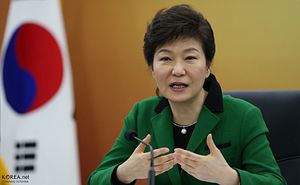Outside South Korea’s Constitutional Court, a group of elderly Korean women stand waiting in hopes of seeing President Park Geun-hye.
To their dismay — they had hoped to jeer at Park — the president does not show up that afternoon for her impeachment trial. The women partly occupy their time by jawing at a lonely member of a group of the president’s supporters known as “Parksamo.”
Park refused to testify twice in the first week of oral arguments. Her rejection the first day shut down proceedings and court moved on without her Thursday after she again refused to appear.
Park is on trial over allegations she violated the constitution by colluding with an old friend, Choi Soon-sil, to extort corporations for personal gain. Arguments in Choi’s criminal trial officially began this week as well.
According to the Associated Press, the impeachment bill also blames Park for restricting media reporting and for government inaction when a ferry, the Sewol, sank in 2014. More than 300 passengers died in the accident.
Park’s lawyer, the AP reports, said the accusations lack evidence and don’t make sense legally. He added that the charges are based on allegations and news reports, not criminal convictions.
Likely few people outside of the half-dozen women staring at the gray, stone court building expected Park to show up for the second hearing. Under law, she cannot be forced to testify. And her lawyers already told local media it’s unlikely she’ll turn up for the duration of the trial.
It’s common for defendants not to testify in a range of court cases around the world. But Park’s silence extends beyond avoiding the courtroom. The president, who’s immune to prosecution while in office, turned down questioning by both prosecutors and a special investigation after originally agreeing to meet.
“If she made a mistake before prosecutors or the special prosecution or the Constitutional Court, that could be an evidence against her,” said Lim Jong-hoon, a law professor at Seoul’s Hongik University. “So, she is reluctant to show up before prosecutors.”
Instead, he said, she wants her lawyers to represent her in all legal proceedings.
Lee Jong-hu, a defense lawyer at Seoul’s Themis Law Firm, said if Park testified, it would give the prosecution an opportunity to question her and potentially strengthen its case.
“She would have to prepare counterarguments besides her own arguments,” he added.
An interrogation could be tough for Park, who rarely holds press conferences and has never held an unscripted Q&A session, according to the Korea Times.
Besides, said Lee, there’s nothing for Park to gain by leaving the Blue House and traveling the roughly 2 kilometers to the Constitutional Court. He said Park already said all she’s going to say when she held an impromptu news conference on New Year’s Day and again proclaimed her innocence.
“She didn’t take any questions as usual and asked reporters not to bring laptops and recorders,” said Lee. “She still presents the attitude that she will only talk about what she wants to talk about.”
The impeachment trial prosecutors, who are National Assembly lawmakers, aren’t necessarily hurting for a statement from Park anyway.
According to Lim, many constitutional law scholars agree the allegations against Park are much more serious than the allegations late President Roh Moo-hyun faced when he was impeached and reinstated by the high court in 2004.
This time, said Lim, the prosecution is more likely to prevail in the impeachment proceedings.
Before arguments began this week, former Constitutional Court Justice Song Doo-hwan said some of the allegations have already been proven by the prosecution and they would be submitted to the Constitutional Court.
So, he said, the court has enough evidence to find the president guilty of violating the constitution.
The Constitutional Court has until June to make a decision and has suggested it may need the entire time.
Defense attorney Lee also reflected on the Roh case, which took about 60 days. He said Park’s case will take longer because the allegations are much more severe. But still, he said, perhaps only 90 days.
“If you consider the evidence that’s already been presented, this case should really take less than that.”
































